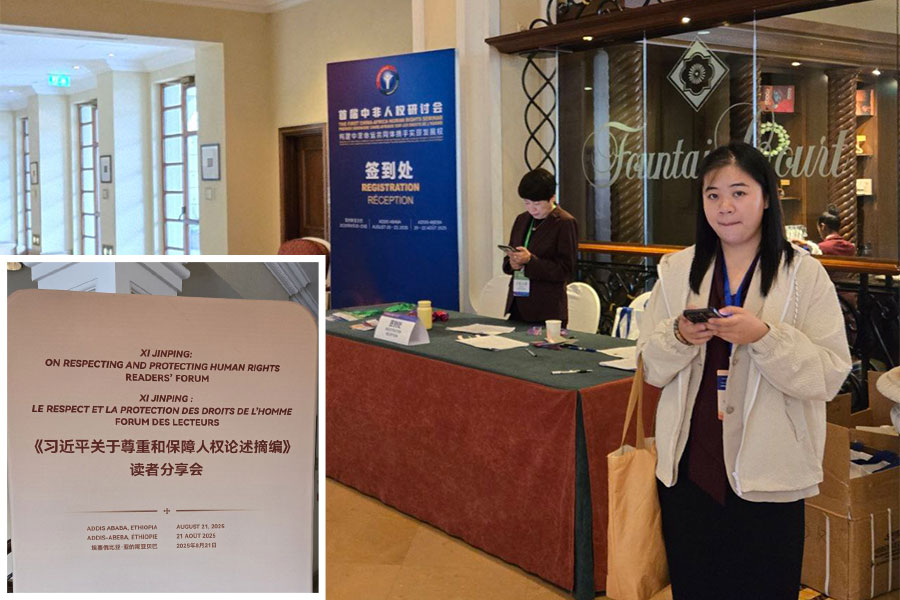
Films Review | May 08,2021
Jul 10 , 2020
By Halima Abate (MD)
In the realm of public administration, it is the complex relationships within a society that magnify problems such as inefficiency and disparities between individuals and groups. Cultivating systematic approaches to fighting such limitations is beneficial, and one of these is effective dialogue, which opens the door to stimulative interactions in our effort to address problems.
Consistent dialogue among stakeholders inspires rational and desirable mutual understanding and relationships to confront shared public concerns and pave the way to a democratic decision-making processes.
Dialogue is a behavior of human interaction where exchanges of ideas or opinions transpire with an aim to reach an amicable agreement. By definition, this tool is indispensable to democratic processes where solutions are just as important to come from the bottom-up as they are from top-to-bottom. It is vital for successful relationship building and mutual understanding but much more crucial in the effort to question long-held assumptions and beliefs.
The exercise of dialogue transcends mere conversation making and serves as a conduit for social learning. But this requires authentic dialogue, which is a key normative component of public deliberation serving as a device to legitimate and construct the sense of the self and other, the community and logic. It is undeniable that compared with the attention given to the institutional side of authentic dialogue, less attention has been devoted to the human communicative behavior in terms of dialogue.
Hence, emphasising the emotional aspects of authentic dialogue will reveal how complex societal problems are confronted through emotional rather than logical means. Discussion on the basis of the understanding of human information processing motivation can lead to a better practice of deliberative democracy, which assures authentic dialogue galvanised by open-mindedness.
What needs to be highlighted here is the importance of criticism. What authentic dialogue requires is not merely being kind and open to opposing ideas but also being critical of what is being learned and discussed. It is also for reflection, shaping what would otherwise be an unmanageable plethora of subject matter, interpretation, inferences and behavioural shifts.
Contemplating the human communicative behavior of dialogue leads us to consider information processing motivations, which can be classified into epistemic, social and compassionate models.
The epistemic information processing motivation model is related to the collective decision-making process, which is crucial for generating legitimacy of the product. However, the degree of level of information processing may tilt to the preferences of the majority. It offers the path of least resistance by virtue of the likelihood that there would be few out there who can criticise the decision that is arrived at.
The social information motivation refers to the individual processes of outcomes either for the self, with the aim of advancing personal goals, or the social, to pursue group goals. The pro-self model could maintain distinct and sometimes even conflicting proclivities, whereas the pro-social attempts can deviate from the wants of the self and serves the public interest, which contributes and feeds back on collective decision-making.
The compassionate information motivation encompasses the willingness to respond empathically to situations as though the individuals were the affected party despite being safe from it.
The inter-connectedness among these three conceptual dimensions will be crucial to proving the insight into the type of leadership and management that is required to enhance the quality of public deliberation.
Political leaders should be cognisant of the human information motivation systems and how they work hand in hand with the values and communication systems within institution contexts. Notable is the importance of balancing these motivations with the problem at hand and the traditional decision-making process of communities.
Having a more nuanced understanding of the nature of deliberation allows us to more effectively leverage emotions and motivations to enable society to better understand one another in terms of their fundamental cultural values, differing ways of expressing themselves and interest.
PUBLISHED ON
Jul 10,2020 [ VOL
21 , NO
1054]


Films Review | May 08,2021

In-Picture | Aug 23,2025

Verbatim | Aug 03,2019

Radar | Mar 26,2022

Viewpoints | Mar 11,2023

Commentaries | Aug 26,2023

View From Arada | Mar 13,2021

Verbatim | Jan 13,2024

Verbatim | Oct 31,2020

Obituary | Jun 17,2023

Photo Gallery | 173939 Views | May 06,2019

Photo Gallery | 164165 Views | Apr 26,2019

Photo Gallery | 154253 Views | Oct 06,2021

My Opinion | 136603 Views | Aug 14,2021
Editorial | Oct 11,2025

Dec 22 , 2024 . By TIZITA SHEWAFERAW
Charged with transforming colossal state-owned enterprises into modern and competitiv...

Aug 18 , 2024 . By AKSAH ITALO
Although predictable Yonas Zerihun's job in the ride-hailing service is not immune to...

Jul 28 , 2024 . By TIZITA SHEWAFERAW
Unhabitual, perhaps too many, Samuel Gebreyohannes, 38, used to occasionally enjoy a couple of beers at breakfast. However, he recently swit...

Jul 13 , 2024 . By AKSAH ITALO
Investors who rely on tractors, trucks, and field vehicles for commuting, transporting commodities, and f...

Oct 11 , 2025
Ladislas Farago, a roving Associated Press (AP) correspondent, arrived in Ethiopia in...

Oct 4 , 2025
Eyob Tekalegn (PhD) had been in the Governor's chair for only weeks when, on Septembe...

Sep 27 , 2025
Four years into an experiment with “shock therapy” in education, the national moo...

Sep 20 , 2025
Getachew Reda's return to the national stage was always going to stir attention. Once...

Oct 12 , 2025
Tomato prices in Addis Abeba have surged to unprecedented levels, with retail stands charging between 85 Br and 140 Br a kilo, nearly triple...

Oct 12 , 2025 . By BEZAWIT HULUAGER
A sweeping change in the vehicle licensing system has tilted the scales in favour of electric vehicle (EV...

Oct 12 , 2025 . By NAHOM AYELE
A simmering dispute between the legal profession and the federal government is nearing a breaking point,...

Oct 12 , 2025 . By NAHOM AYELE
A violent storm that ripped through the flower belt of Bishoftu (Debreziet), 45Km east of the capital, in...